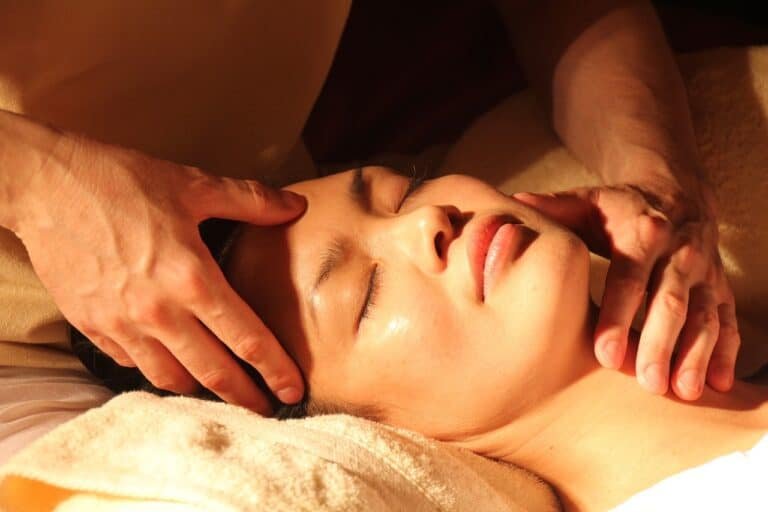Pineal Gland Sleep Quality Impact & Health Study Insights

Wellness Fixation is reader supported, meaning I may earn a small commission if you purchase something through my links at no extra cost to you. Thanks for your support! Learn more
Key Takeaways
- The pineal gland plays a critical role in regulating sleep by producing melatonin, which is crucial for maintaining the sleep-wake cycle.
- Exposure to light, especially blue light from screens, can suppress melatonin production, leading to poor sleep quality.
- Incorporating natural light during the day and ensuring darkness at night can enhance melatonin production and improve sleep.
- A balanced diet rich in tryptophan can support melatonin synthesis and promote better sleep.
- Establishing a consistent sleep routine and minimizing technology use before bed can significantly improve sleep quality.
Pineal Gland’s Role in Sleep Quality and Health
The pineal gland, although small, has a big job. Nestled deep within the brain, it produces melatonin, the hormone that regulates our sleep-wake cycle. When the sun sets, and darkness falls, the pineal gland releases melatonin into the bloodstream, signaling to our body that it’s time to wind down and prepare for sleep.
The Function of the Pineal Gland
Think of the pineal gland as the body’s internal clock. It responds to the light-dark cycle of our environment. During the day, exposure to natural light suppresses melatonin production, keeping us alert and awake. As the day transitions to night, the absence of light triggers melatonin release, facilitating sleep. This process is vital for maintaining our circadian rhythm, which is the natural, internal process that regulates the sleep-wake cycle and repeats roughly every 24 hours.
Melatonin’s Influence on Sleep
Melatonin is often referred to as the “sleep hormone” for good reason. It not only helps us fall asleep but also improves the quality of sleep by regulating the various stages of sleep. For example, melatonin ensures we spend enough time in the restorative stages of sleep, like deep sleep and REM (rapid eye movement) sleep. This is crucial because these stages are when the body repairs itself and the brain processes information from the day.
However, melatonin’s influence extends beyond just sleep. It also plays a role in regulating mood, immune function, and even body temperature. Therefore, maintaining optimal melatonin levels is essential for overall health.
Effect of Light Exposure on the Pineal Gland
One of the most significant factors affecting the pineal gland’s function is light exposure. Modern lifestyles often involve prolonged exposure to artificial light, especially from electronic devices, which emit blue light. This type of light can trick the pineal gland into thinking it’s still daytime, thereby suppressing melatonin production and delaying sleep onset.
“Using screens before bed can reduce melatonin levels by up to 50%, making it harder to fall asleep and stay asleep.”
To counteract this, I recommend limiting screen time at least an hour before bed and using blue light filters on devices. You can also try dimming the lights in your home in the evening to signal to your body that it’s time to prepare for sleep.
Factors Affecting Pineal Gland Function
Impact of Diet and Nutrition
What we eat can significantly impact the pineal gland’s ability to produce melatonin. Foods rich in tryptophan, an amino acid that the body converts into melatonin, can be particularly beneficial. These include turkey, chicken, nuts, seeds, tofu, cheese, and oats. To explore more, you can check out foods that support pineal gland health.
Besides tryptophan, other nutrients like magnesium, calcium, and vitamin B6 play supportive roles in melatonin synthesis. Therefore, a balanced diet incorporating these nutrients can help optimize melatonin production and improve sleep quality. Additionally, certain foods for pineal gland health may also support this process.
Importance of a Dark Sleep Environment
Creating a dark environment is crucial for promoting melatonin production. Even small amounts of light can disrupt the pineal gland’s function. Consider using blackout curtains in your bedroom and removing or covering any electronic devices that emit light.
Additionally, you can use an eye mask to block out light if you’re unable to make your room completely dark. This simple change can make a significant difference in your ability to fall asleep and stay asleep throughout the night.
Research Findings on Pineal Gland and Sleep
Research into the pineal gland and its role in sleep has provided significant insights into how this tiny organ affects our overall well-being. Studies consistently show that the pineal gland’s primary function is to regulate melatonin production, which in turn, governs our sleep-wake cycles. This relationship underscores the importance of the pineal gland in maintaining healthy sleep patterns and, by extension, overall health.
Moreover, the pineal gland is influenced by various external and internal factors, such as light exposure, diet, and stress levels. Understanding these factors allows us to better manage our sleep quality by optimizing the conditions that support pineal gland function.
Recent Studies on Sleep Disturbances
Recent studies have highlighted the prevalence of sleep disturbances in modern society and their potential link to pineal gland dysfunction. For instance, research has shown that individuals who experience chronic sleep disturbances often have irregular melatonin production patterns. This can result from excessive light exposure at night, irregular sleep schedules, or even dietary deficiencies.
One study found that participants who used electronic devices before bed had significantly lower melatonin levels compared to those who avoided screens in the evening. This finding emphasizes the impact of blue light on the pineal gland and the importance of reducing screen time before sleep to prevent disturbances.
Correlation Between Pineal Gland Dysfunction and Sleep Disorders
There’s a growing body of evidence suggesting that dysfunction of the pineal gland can lead to various sleep disorders, such as insomnia and delayed sleep phase syndrome. Insomnia, characterized by difficulty falling or staying asleep, is often linked to inadequate melatonin production, which can be a result of pineal gland issues.
Delayed sleep phase syndrome, a disorder where the sleep-wake cycle is delayed by several hours, has also been associated with irregular melatonin secretion. By addressing the underlying pineal gland dysfunction, individuals suffering from these disorders may experience improvements in their sleep patterns.
Health Implications of Impaired Pineal Function
Impaired pineal function can have far-reaching health implications beyond sleep disturbances. Chronic sleep deprivation resulting from inadequate melatonin production can lead to a host of health issues, including weakened immune function, increased risk of cardiovascular disease, and impaired cognitive function. For more information on maintaining pineal gland health, explore our detailed guide.
Additionally, poor sleep quality can contribute to mood disorders such as depression and anxiety. Therefore, ensuring optimal pineal gland function is not only vital for good sleep but also for maintaining overall physical and mental health.
Natural Ways to Support Pineal Gland Health
Supporting the health of the pineal gland can significantly improve sleep quality and overall well-being. There are several natural strategies that can help enhance pineal gland function and promote healthy melatonin production.
Dietary Recommendations for Melatonin Production
Incorporating foods rich in tryptophan, magnesium, calcium, and vitamin B6 can support melatonin synthesis. Tryptophan is an amino acid found in turkey, chicken, and nuts, which the body converts into melatonin. Magnesium, found in leafy greens and nuts, helps to calm the nervous system, promoting better sleep.
Calcium, present in dairy products and leafy greens, works alongside magnesium to support melatonin production. Vitamin B6, found in fish, bananas, and chickpeas, is essential for converting tryptophan into melatonin. Including these nutrients in your diet can naturally boost melatonin levels and improve sleep quality.
Optimizing Sleep Environment for Better Results
Creating an optimal sleep environment is crucial for supporting pineal gland function. Ensuring your bedroom is dark, quiet, and cool can enhance melatonin production and promote restful sleep. Consider using blackout curtains to block out external light and earplugs or a white noise machine to minimize noise disturbances.
Additionally, maintaining a comfortable room temperature, typically between 60-67°F (15-19°C), can facilitate better sleep. A cool environment signals to the body that it’s time to rest, further supporting the pineal gland’s role in regulating sleep.
Incorporating Meditation and Relaxation Techniques
Stress can negatively impact the pineal gland’s ability to produce melatonin. Incorporating meditation and relaxation techniques into your daily routine can help manage stress levels and support better sleep. Practices such as deep breathing, progressive muscle relaxation, and mindfulness meditation can calm the mind and prepare the body for sleep.
Spending just a few minutes each day focusing on relaxation can have a significant impact on your overall sleep quality. These techniques can help reduce stress hormones that may interfere with melatonin production, allowing the pineal gland to function optimally.
Exercise and Its Effects on Sleep Quality
Regular physical activity is another effective way to support pineal gland health and improve sleep quality. Exercise helps regulate the body’s internal clock, promoting a healthy sleep-wake cycle. Engaging in moderate aerobic exercise, such as walking, jogging, or cycling, for at least 30 minutes a day can enhance melatonin production and improve sleep.
However, it’s important to avoid vigorous exercise close to bedtime, as it can increase adrenaline levels and make it harder to fall asleep. Aim to complete your workout at least a few hours before bed to allow your body to wind down and prepare for restful sleep.
Practical Tips for Enhancing Sleep Quality
Improving sleep quality is essential for overall health and well-being. By incorporating a few practical tips into your daily routine, you can enhance your sleep and support the pineal gland’s function. Let’s explore some strategies that can help you achieve better sleep.
Establishing a Consistent Sleep Schedule
One of the most effective ways to improve sleep quality is by establishing a consistent sleep schedule. Going to bed and waking up at the same time every day helps regulate your body’s internal clock, making it easier to fall asleep and wake up naturally. Try to stick to your schedule even on weekends to reinforce your body’s sleep-wake cycle.
Strategies to Minimize Technology-Related Disruptions
Technology, particularly screens, can significantly disrupt sleep patterns. To minimize these disruptions, avoid using electronic devices at least an hour before bedtime. If you must use screens, consider enabling blue light filters or using apps that reduce blue light exposure. This can help reduce the impact on melatonin production and improve sleep quality.
Using Natural Supplements Wisely
Natural supplements, such as melatonin and valerian root, can be helpful in promoting sleep. Melatonin supplements can be particularly beneficial for individuals with irregular sleep schedules or those experiencing jet lag. However, it’s important to use these supplements wisely and consult with a healthcare professional before starting any new supplement regimen.
Frequently Asked Questions (FAQ)
Understanding the role of the pineal gland and melatonin in sleep can help you make informed decisions about your sleep habits. Here are some frequently asked questions about sleep and the pineal gland.
How does the pineal gland regulate sleep?
The pineal gland regulates sleep by producing melatonin, a hormone that signals the body to prepare for sleep. Melatonin production is influenced by the light-dark cycle, with levels rising in the evening and falling in the morning. This process helps maintain a regular sleep-wake cycle.
- Light exposure during the day suppresses melatonin production, keeping you awake.
- Darkness triggers melatonin release, signaling it’s time to sleep.
- Disruptions in this cycle can lead to sleep disturbances.
By supporting the pineal gland’s function, you can improve your sleep quality and overall health.
Why is melatonin important for sleep?
Melatonin is crucial for regulating the sleep-wake cycle. It helps you fall asleep faster and ensures you spend enough time in the restorative stages of sleep. Additionally, melatonin plays a role in regulating mood, immune function, and body temperature, making it essential for overall health.
How much sleep is optimal for health?
The optimal amount of sleep varies by age and individual needs. Most adults require 7-9 hours of sleep per night to function at their best. However, some people may need more or less sleep depending on their lifestyle, health, and genetic factors. It’s important to listen to your body and ensure you get enough rest to feel refreshed and alert during the day. For more insights, you can explore the understanding sleep guide from the National Institute of Neurological Disorders and Stroke.
In conclusion, by understanding the role of the pineal gland and melatonin in sleep, you can take proactive steps to improve your sleep quality. Incorporate these practical tips into your routine to support your body’s natural sleep-wake cycle and enhance your overall well-being.








